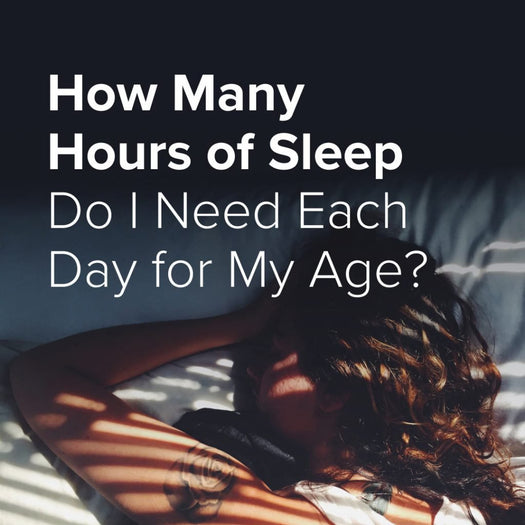How Many Hours of Sleep Do I Need Each Day for My Age?

It’s no secret that getting enough sleep is essential for good health, and you’ve probably felt some of the short-term effects of even a single night of sleep deprivation. Still, many people are skimping on sleep and believe that they can function perfectly fine on four hours a night. In this article, we’ve debunked a few common myths and given a summary of the sleep guidelines that are accepted by the experts.
Common Sleep Myths
1. Everyone needs 8 hours of sleep, every night.
FALSE. The current recommendations of how many hours of sleep you need depends mostly on your age. Infants and children need significantly more sleep than adults as they are growing and developing at a rapid pace. Newborns require the most sleep (14-17 hours a day) while older adults generally require the least amount of sleep (7-8 hours). We’ll get more into these details later.

2. Sleeping in on weekends will make up for the sleep you lost during the week.
FALSE. One of the best things you can do for your sleep patterns is to go to bed and wake up at the same time everyday. Our bodies love routine and run more efficiently when they know what to predict.
If you are sleep deprived during the week, you are likely getting insufficient amounts of deep sleep, where a lot of the tissue repair, immune system work, and growth hormone production occurs (1). Since we have only a few opportunities a night to get deep sleep, it cannot be made up for during 1 or 2 days of sleeping in.
Learn more about how to combat “Social Jetlag” here.
3. Napping during the day makes up for lost sleep at night.
FALSE. Napping always seems like a good idea until 2.5 hours later you wake up feeling even more groggy! While taking a 10-20 minute “power nap” can be a useful thing to promote energy levels, napping for longer than 20-30 minutes at a time can be harmful to your nighttime sleep.
Shorter naps prevent you from getting into the deepest stages of your sleep cycle which is why you are more likely to feel energized with a shorter rather than longer nap (2).
Nighttime sleep is very important to overall health in part because of the need to regulate our circadian rhythm, but also because of the important hormonal processes that occur at night and when it’s dark. Melatonin is a hormone produced in the body only when it’s dark—this means that even having lights from a TV, night light, or outside light sources can disrupt production (3).

So How Many Hours Of Sleep Do I Need?
In 2015, the National Sleep Foundation (NSF) published a report on the recommendations for sleep duration based on 312 existing papers. Based on their findings, they created the below chart (4).
Key Findings include:
- The recommendations for sleep duration are based on age, from newborn to adults over 65 years old. They’ve also included a “may be appropriate” range of sleep duration as different people may require different amounts of sleep than the average recommendation.
- One important thing to note is that they include minimum and maximum sleep requirements for all ages. For adults 26-64 years old, less than 6 hours and more than 10 hours is viewed as not recommended (4).
- We know that adults need around 8 hours a night, but not everyone has the same needs—some older adults may require as little as 5 hours on average, and some newborns as much as 19 hours. For most adults (ages 26-64), 7-9 hours a night should be what you are aiming for (4).

Some exceptions to the adult recommendations would include pregnant women and high-intensity athletes, both of whom would likely require more sleep than the average recommendations.
On top of the total number of sleep hours you are getting, another important consideration is your sleep quality:
Do you find that no matter how many hours you sleep, you still feel unrested in the morning?
This definitely points to some issues with the quality of your sleep. The most likely reason for feeling groggy in the morning is not getting enough deep sleep, or perhaps waking during the deepest parts of your sleep cycle. Also, remember that being in bed is not the same as being asleep.
How long does it take for you to fall asleep? Do you lie in bed for an extra 15 minutes after your alarm goes off?
If it takes 20 minutes or more to fall asleep or if you are awake while in bed, deduct these times from your total sleep calculations. On the other end of the spectrum, falling asleep quickly (having a fast sleep latency) can be an issue as well. According to the Encyclopedia of Sleep by D. Thomas and W.M. Anderson, pathologic sleepiness is defined as a mean sleep latency <5 min and this has been associated with impaired performance.

How Can I Get More Sleep?
There are only 24 hours in a day and adults should be spending a minimum of one-fourth to one-third of that time sleeping. Trying to balance work, meal planning, kids, exercise, and your social life is hard enough for many of us, so getting more sleep seems like a pipe dream.
However, sleep is an essential component of health and there are many diseases associated with poor sleep or too little sleep. Heart disease, obesity, and diabetes are all linked to poor sleep habits, whether it’s too much or too little sleep (5).
You’ll notice in the NSF’s chart above that they put in upper limits of sleep as well.
Too much sleep can also be a sign of underlying health issues or point to chronic disease. If you are experiencing consistent changes to your sleep patterns, make sure you’re working with your doctor or a licenced professional to find out the root issues of your sleep issues are.

If you are getting less than the recommended hours of sleep, try to gradually increase your sleeping time. Set a goal to go to bed 15 minutes earlier—this can be a lot easier than saying you’ll go to bed 1-2 hours earlier. After you’ve been successful, add another 15 minutes until you reach your goal time.
If adding on an extra 30 minutes or an hour of sleep is an impossible task for you, focus on improving the quality of your sleep. Practicing good sleep hygiene habits are key to improving your sleep quality.
- Avoid sleep disruptors like caffeine and alcohol
- Avoid screen time at least 1 hour before bed
- Exercise daily, but not too close to bedtime
- Sleep in a dark, quiet, and cool environment
- Meditate regularly and/or establish a sleep meditation ritual
These sleep tips are designed to not only help you get more restful sleep, but to also decrease the amount of time you toss and turn in bed before falling asleep.
Need help establishing a sleep meditation ritual?
Muse S and Go-to-Sleep Journeys can help. These meditations will help lull you into relaxation before a deep night’s rest. Listen to a sample of one of our Go-to-Sleep Journeys below.

References:
- Sleep.org: Understanding Sleep Cycles: What Happens While You Sleep https://www.sleep.org/articles/what-happens-during-sleep/
- National Institute of Neurological Disorders and Stroke. Brain Basics: Understanding Sleep https://www.ninds.nih.gov/Disorders/Patient-Caregiver-Education/Understanding-Sleep#2
- Harvard University: External Factors That Influence Sleep http://healthysleep.med.harvard.edu/healthy/science/how/external-factors
- Hirschkowitz M, Whiton K, Albert S, et al. National Sleep Foundation’s sleep time duration recommendations: methodology and results summary. Sleep Health Journal. (2015) 40-43. https://www.sleephealthjournal.org/action/showPdf?pii=S2352-7218%2815%2900015-7
- National Sleep Foundation: How Excessive Sleep Can Affect Your Metabolism https://www.sleepfoundation.org/articles/how-excessive-sleep-can-affect-your-metabolism
